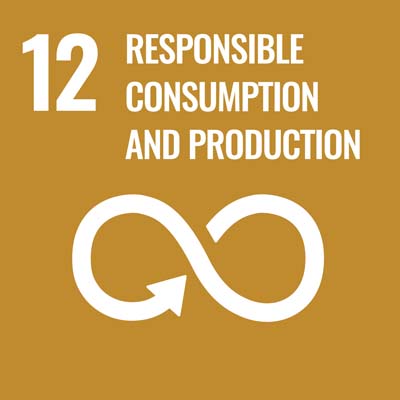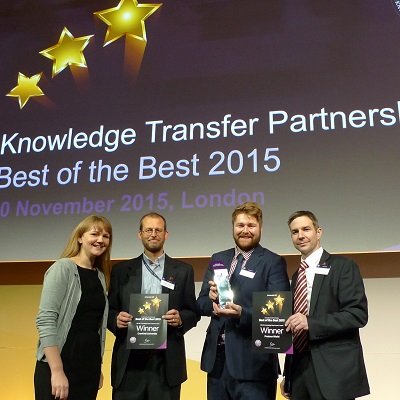The twelfth Sustainable Development Goal is to ensure sustainable consumption and production patterns.
2023 progress report
Organisation
Progress against our sustainability actions is included in the Annual Environmental Report.
A new sustainable food and beverage policy commits Cranfield to drive progress towards aims such as reducing single use plastics and packaging, and operating catering services in accordance with the waste hierarchy.
We are working to strengthen our procurement processes to include circular economy principles and sustainability requirements at each procurement stage, for example, our new furniture contract is with PRS Office Furniture who follow a five-step approach to sustainable furniture provision.
Research
Research highlights for this SDG in 2022/23 included:
- A study funded by Innovate UK demonstrated that low-cost, commercially available polymers can reduce soil splash by more than 90% and ‘soiling’ of beans by more than 65%.
- A £500,000 grant from the Wolfson Foundation will help Cranfield establish the National Environment Sector Decarbonisation Accelerator (NESDA) test facility to accelerate the development of sustainable fuels from waste.
- Research on the state of traceability in the fishery industry in the UK will work with governmental organisations in the UK to better understand the position.
- The OMENZ project works to ensure biomass feedstocks such as Miscanthus are available to fuel the emerging bio-economy.
- Circular Economy Network in Transport Systems (CENTS) celebrated the outputs from the four-year programme to foster a vibrant community of practice with a specific focus on applying circular economy principles within sustainable transportation systems.
Outreach
The 2022-23 student moveout campaign saw a continued arrangement with the British Heart Foundation’s ‘Pack for Good’ campaign and the NEED Project. The donations provide much needed items for the charity shops and families in need in the local area.
Our popular Sustainability Network Speaker Series included a fascinating debate on 'How sustainability and net zero are driving innovation in the Food Sector?' and a panel discussion considering whose job is it to make global supply chains more sustainable.
2022 progress report
Organisation
Progress against our sustainability actions is included in the Annual Environmental Report.
A new zero waste target is now in place. Waste minimisation and recycling are incorporated fully into operations, with food waste being taken for anaerobic digestion. We have four recycling streams on campus, and waste is taken to Cawley’s recycling material facility and recycled further. Students are encouraged to reduce waste and recycle where possible through Green Team activities.
The supply chain is considered before purchasing items. Products are sourced from an ethical and sustainable source and certified product standards such as Fairtrade are sourced where possible.
Research
Research highlights for this SDG in 2021/22 included:
- TransFIRe – a collaborative research project involving multiple partners from industry and academia which aims to build a proactive, interdisciplinary, inclusive research and practice driven hub that:
- optimises the flows of all resources within and between the foundation industries and their supply chains;
- improves their competitiveness;
- works with communities in which they are located;
- supports UK Net Zero 2050 targets for GHG emissions; and
- furthers equality, diversity and inclusion in the foundation industries.
- Film of the Future – producing an antiviral, antimicrobial, biodegradable plastic from seaweed, aiming to reduce the environmental impact of current packaging solutions.
- The Horticulture and Food Loss Network aims to improve crop quantity and output whilst reducing food loss and waste. The Network is jointly led by Cranfield University (Professor Leon A. Terry) and the University of Reading (Professor Carol Wagstaff).
- The AGROMIX project aims to drive transition to more resilient and efficient land use in Europe, focusing on the synergies found in mixed farming and agroforestry systems and the associated value chains. Based on 12 contrasting pilot sites across Europe, the project involves 10 universities, 7 research institutes and 11 multi-actor partners and seeks to inform the development of future agricultural policy.
Outreach
Our sustainability speaker series included a wider debate on the adoption of digital technologies for sustainable manufacturing and a panel session, in which we invited an international buyer, a supplier, and a representative from a trading initiative to discuss whose job is it to make these global supply chains more sustainable.
2021 progress report
Our waste and recycling pages provide evidence for the University’s commitment to a new target for ‘Zero Avoidable Waste’ by 2030. We aim to minimise waste ending up in landfill or incineration and to embrace the application of circular economy principles. The management of waste has improved significantly since the baseline year 2010. During 2021 the University worked to increase the proportion of waste going for recycling, composting and anaerobic digestion through providing a wider range of facilities for segregation into individual recyclable waste streams and corresponding internal bin facilities.
Half of the waste is now segregated for recycling on site, with a further percentage separated and sent for recycling off site. There has been significant progress in the reduction of waste on campus, especially with disposable plastics. There is also a focus on making sure items get passed on for reuse where possible. For example, at the end of every academic year we encourage departing students to donate unwanted items to the Cranfield Donate scheme. The donations are donated to local homeless and animal charities.
Courses/modules relating to the goal
The following courses either address sustainability entirely or contain modules that are focused on sustainability-related topics.
Accounting and Finance MSc
Aerospace Manufacturing MSc
Applied Bioinformatics MSc
Engineering and Management of Manufacturing Systems MSc
Environmental Engineering MSc
Environmental Management for Business MSc
Executive Logistics and Supply Chain Management MSc
Finance MSc
Executive MBA
Food Systems and Management MSc
Future Food Sustainability MSc
Global Product Development and Management MSc
Logistics and Supply Chain Management MSc
Management and Corporate Sustainability MSc
Management and Entrepreneurship MSc
Management and Human Resource Management MSc
Management and Information Systems MSc
Management and Leadership MSc
Management MSc
MBA
Metal Additive Manufacturing MSc
Procurement and Supply Chain Management MSc
Robotics MSc
Sustainability MSc
Sustainable and Digital Banking (Retail) MSc
Welding Engineering MSc

